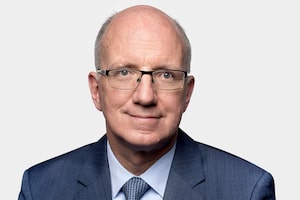
People use electronics outside a coffee shop in Toronto amid a countrywide Rogers outage, affecting many of the telecommunication company's services on July 8.Cole Burston/The Canadian Press
When Rogers Communications Inc. RCI-A-T networks went down for the second time in as many years last Friday, paralyzing much of the country, many Canadians reacted with dark humour.
“Has Rogers tried turning their system off, then on again? Or, like, unplugged their modem, waited 5 seconds, then plugged it back in?” said one wag on Twitter. Another tweet said: ”Rogers remains on hold, waiting to speak to their own tech support. So far, they’ve been reassured that despite unusually high call volumes, their call is important and will be answered in priority sequence.”
Unfortunately, wonky wireless and internet services are no joke.
When one telecom company’s equipment maintenance woes shut down 911 emergency calls, banking and other essential services across the country, the network clearly needs a fix. Rogers understands what’s at stake. “We let you down,” chief executive Tony Staffieri said on the weekend in a letter to customers and all Canadians. “You have my personal commitment that we can, and will, do better.”
What should regulators do to avoid another network failure? That question is top of mind for François-Philippe Champagne, federal Minister of Innovation, Science and Industry, who met virtually with telecom CEOs on Monday afternoon to discuss system reliability. And what bearing, if any, should Friday’s outage have on Rogers’s bid to rewire the telecom industry by acquiring Shaw Communications Inc. SJR-A-X?
The Rogers outage is an opportunity to change how we think about our digital infrastructure
Ottawa will require telecoms to assist each other during network failures following Rogers outage
Sale of Freedom Mobile to Quebecor is the best outcome for cellphone users
The answers to those questions are related.
First off, keep in mind that the Rogers outage on Friday only affected its customers, including cellphone service resellers such as TekSavvy that piggyback on Rogers’s network. Rivals such as the Bell BCE-T, Telus T-T, SaskTel and Quebecor QBR-A-T platforms continued to operate.
Where TekSavvy competes while making minimal investments in infrastructure, those “facilities-based” rivals fight to win clients onto their own networks. What happened last Friday shows how important redundancy can be in an essential service. As telecom consultant Mark Goldberg said Monday in a blog post, “Last week’s network failure should serve to reaffirm Canada’s telecom policy promoting facilities-based competition.”
To enhance competition among providers – ensuring low prices and reliable service – Canadians don’t need more resellers. They need more robust facilities-based providers, co-ordinated to provide seamless emergency services.
There’s no way to create a perfect network. Telecom systems will occasionally crash, as do electric grids or cloud computer networks. In the telecom sector, government’s goal should be minimizing disruptions that come with problems on any one platform.
“While arguments for increased competition to reduce future failure risk abound, the same arguments could apply to many other industries in Canada, such as electric or gas distribution,” analyst Maher Yaghi at Scotiabank said in a report on Monday. “Failure points in systems have always existed, regulatory oversight however needs to balance the risk of future failures against the increased consumer/economic costs in building other parallel networks.”
Which brings us to Rogers’s bid for Shaw. Last month, the two companies announced plans to sell Shaw’s Freedom Mobile cellphone platform to Quebecor Inc. for $2.85-billion. Rogers reluctantly agreed to this divestiture to appease competition concerns from government regulators, including the Competition Bureau.
Quebecor would initially share networks with Rogers in markets such as British Columbia, Alberta and Ontario, where Freedom Mobile operates. However, over time, the Montreal-based company can build its own facilities across the country and share the cost of constructing new networks with Rogers. Keep in mind that Bell and Telus have a similar sharing arrangement on infrastructure such as telecom towers.
Friday’s outage should be a wake-up call to the Competition Bureau and Mr. Champagne: More investment is required in the telecom sector. Blocking Rogers’s bid for Shaw won’t create competition, and as the Shaw family has said – loud and clear – they will no longer commit capital to Freedom Mobile.
Quebecor as a fourth national cellphone service makes sense for competitive reasons, by every definition, including the nation’s need for robust, reliable service.
Over more than a decade, the company has built a track record for delivering service to 22 per cent of the Quebec market. Approving a Rogers takeover that makes Quebecor a well-capitalized, motivated national player helps ensure a more reliable wireless network.
Your time is valuable. Have the Top Business Headlines newsletter conveniently delivered to your inbox in the morning or evening. Sign up today.
 Andrew Willis
Andrew Willis